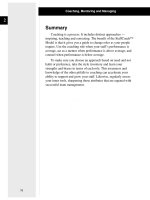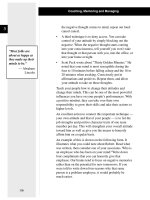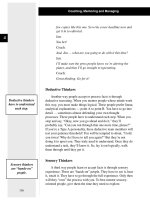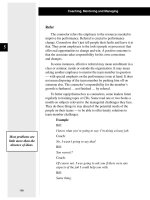Coaching, Mentoring and Managing breakthrough strategies 1 PHẦN 1 docx
Bạn đang xem bản rút gọn của tài liệu. Xem và tải ngay bản đầy đủ của tài liệu tại đây (222.14 KB, 15 trang )
TEAMFLY
Team-Fly
®
Coaching, Mentoring
and Managing
A Coach Guidebook
By Micki Holliday
The Career Press, Inc.
Franklin Lakes, NJ
Copyright © 2001 by Micki Holliday
All rights reserved under the Pan-American and International Copyright Conven-
tions. This book may not be reproduced, in whole or in part, in any form or by
any means electronic or mechanical, including photocopying, recording, or by any
information storage and retrieval system now known or hereafter invented, without
written permission from the publisher, The Career Press.
C
OACHING, MENTORING, AND MANAGING: REVISED ED.
Cover design by Foster & Foster Inc.
Printed in the U.S.A. by Book-mart Press
To order this title, please call toll-free 1-800-CAREER-1 (NJ and Canada:
201-848-0310) to order using VISA or MasterCard, or for further information on
books from Career Press.
The Career Press, Inc., 3 Tice Road, PO Box 687
Franklin Lakes, NJ 07417
www.careerpress.com
Library of Congress Cataloging-in-Publication Data available upon request.
About Rockhurst University
Continuing Education Center, Inc.
Rockhurst University Continuing Education Center, Inc. is committed to
providing lifelong learning opportunities through the integration of innovative education
and training.
National Seminars Group, a division of Rockhurst University Continuing
Education Center, Inc., has its finger on the pulse of America’s business community.
We’ve trained more than 2 million people in every imaginable occupation to be more
productive and advance their careers. Along the way, we’ve learned a few things — what
it takes to be successful … how to build the skills to make it happen … and how to
translate learning into results. Millions of people from thousands of companies around
the world turn to National Seminars for training solutions.
National Press Publications is our product and publishing division. We offer a
complete line of the finest self-study and continuous-learning resources available
anywhere. These products present our industry-acclaimed curriculum and training
expertise in a concise, action-oriented format you can put to work right away. Packed
with real-world strategies and hands-on techniques, these resources are guaranteed to
help you meet the career and personal challenges you face every day.
Legend Symbol Guide
Exercises that reinforce your learning experience
Questions that will help you apply the critical points to your situation
Checklists that will help you identify important issues for
future application
Key issues to learn and understand for future application
Real-world case studies that will help you apply the information
you’ve learned
?
C
A
S
E
S
T
U
D
Y
Table of Contents
Introduction ix
Reinventing Success ix
The StaffCoaching Model™ x
Investing in the Real Resources xi
It All Comes Down to Winning xii
1 Getting Results Is All About You 1
Understand Your Role as Coach 1
Cultivate the 10 Values of a Successful StaffCoach™ 2
Case Study 18
Case Study Analysis 19
Case Analysis 21
What You Value Impacts Your Team 22
Exercise: Tracing Your Personal Values History 24
Exercise Analysis 26
Five Insights of High-Performance Coaches 27
Case Study 34
Analysis 34
Summary 35
Chapter Quiz 36
2 The Five-Step StaffCoaching™ Model 37
Coaching Is a Performance Process 37
Steps in the StaffCoach Model to Maximize Potential 40
Know Your Employees’ Character and Capabilities: Four Effective Techniques 41
Review Insights: Combine and Consider 51
Your StaffCoaching™ Style 52
Analysis of Your Preferences and Tendencies 54
Six Pitfalls to Your StaffCoaching™ Success 55
Case Study 60
Case Analysis 61
Ten Tools to Ensure Team Results 62
Case Study 72
Case Study Analysis 74
Summary 76
Chapter Quiz 77
3 The Coaching Role: Inspiring and Motivating 79
The Coaching Role 80
Some Cautions for the Coach 111
Steps for Effective Coaching Interactions 112
Common Activities for the Coach 113
What to Expect When You’re Doing It Right 114
Case Study 118
Case Analysis 121
Summary 123
Chapter Quiz 124
4 The Mentoring Role: Instruction by Example 125
A Process With Productive Purpose 127
Ten Tips for Mentors 132
The Six Ways People Think 134
Style Analysis Questions 141
The Three Key Phases of Successful Mentoring 142
Exercise 147
The Outcome of Effective Mentoring 152
The Treasure of Mentoring 156
Summary 157
Chapter Quiz 158
5 The Counselor Role: Confrontation and Correction 161
Opportunities to Counsel 163
Four Keys to Effective Counseling 165
Guidelines for Counseling 168
The Philosophy of Confrontation: A Positive Approach to Negative Events 169
The Five-Step Confrontation Process 172
Eight Ways to Eliminate Unsatisfactory Behavior 176
Counseling Evaluation Exercise 182
Ten Essentials for Face-to-Face Counseling 183
Case Study 187
Case Analysis 188
Five Steps to Modifying Behavior 189
Behavior Modification Exercise 192
Ask Questions That Get the Answers You Need 193
Exercise: Creating Open-Ended Alternatives 194
The Results of Effective Counseling 195
Exercise: Does Counseling Work for Your Team? 196
Summary 197
Chapter Quiz 198
6 Integrating the Individual and the Team 199
Group vs. Team 200
Instill Team Vision 201
Recognize the Potential for Team Trouble 204
Case Study 207
Case Analysis 209
Commitment and Mutual Support 210
A Checklist for Responding to Team Troubles 213
“Look Before You Leap” Checklist 217
Focus the Team With Shared Priorities 218
Exercise 223
Right Thinking About Team Purpose 224
Summary 224
Chapter Quiz 225
7 Managing Within the StaffCoaching™ Model 227
Doing or Developing 227
A Story About Managing 228
Exercise 229
Exercise Analysis 231
Delegating and the StaffCoaching™ Role 232
Exercise 233
Exercise Analysis 236
Personality and Your Coaching Role 237
Hurdles to Performing Your Coaching Role 238
Exercise 248
Four Points for Managing Within the StaffCoach™ Model 250
Exercise: Applying the Four “P’s” 252
Exercise Analysis 253
Five Ways to Quiet Complaints 253
Team Collaboration 256
Summary 257
Chapter Quiz 258
8 So What and Who Cares! 259
The Coach Attitude 260
Exercise 260
Exercise Analysis 261
Exercise Analysis 262
Exercise Analysis 264
Exercise Analysis 265
Exercise Analysis 267
Exercise Analysis 268
Attitude and Values 269
The Key Ingredients 270
Tools for Your Team 272
The Wisdom of Coaching 274
Exercise 275
Exercise Analysis 276
Lasting Impact 276
Index 279
Value the person and enjoy the results.
NTRODUCTION
I
ix
There are two realities in business today: Get results and keep
your result-getters! This is becoming increasingly difficult as
globalization, technology and demographic changes bombard
today’s managers. Add to this the increased roles and
responsibilities placed on the manager and chaos erupts.
First, managers were hired to manage — take care of the
business. Then, managers had to be leaders — provide vision and
mission. Now, they must recruit and train, inspire and motivate,
correct and empower. What’s a poor manager to do?
The answer is to coach. As a 21st-century manager, you are
continually challenged to shift how you, as a leader, manage your
most important and only unlimited resource: your people. Henry
Kissinger once said, “Leaders take their staff from where they are
to where they’ve never been before.” That’s what the role of
coach lets you do — take a diversely proficient group of people,
expand and grow their skills, keep them satisfied and motivated,
and, most importantly in this competitive environment, retain
their talent.
Reinventing Success
Sports teaches organizations the value of a coach. Whether
coaching a team or an individual, different approaches require
different skill levels, attitudes and motivation. Business, industry,
x
government and the not-for-profit sectors, likewise, have been
faced with the sad truth that people just aren’t as motivated and
accepting as they were in the last century. Mary Kay Ash noted the
change when she said, “There are two things people want more
than sex and money … recognition and praise.”
Coaching is the process of using that wisdom to help
employees experience and work through the changes required
of them.
Societal change caused management to shift from an
authoritarian “my way or the highway” style to an all-inclusive
approach that requires the manager to be a coach, cheerleader,
mentor, trainer, disciplinarian and counselor. Coaches in sports do
what organizations must do: create environments where
individuals are motivated to produce results. That environment
must be supportive, instructive and satisfying to the degree that
employees want to grow within it.
The StaffCoaching Model™
The purpose of this book is to give you a model that directs
the many roles demanded of your job: getting results, retention
and creating a positive environment. Trademarked by National
Seminars StaffCoach™ Model, the word “coach” encompasses
three distinct roles or approaches: coaching, mentoring and
counseling. How you respond to people and choose a specific
action depend on your employees’ proficiency. Not all your
employees need your assistance to change, develop or improve.
Often your people can create new behaviors and attitudes
themselves. It’s a good news/bad news scenario: The good news is
that very few people need constant coaching, and the bad news is
that all three roles of coaching are needed continuously.
Coaching is an excellent activity for your people who are
performing okay. They meet goals and perform tasks at standard
— no more, no less. A coach, by definition, helps workers grow
and improve their job performance by providing suggestions and
encouragement. Mentoring is the best approach for your above-
average performers, those who are excelling. The mentor, by
definition, is an individual with advanced experience and
Coaching, Mentoring and Managing
TEAMFLY
Team-Fly
®
knowledge who is committed to giving support and career/job
advice to a less experienced person. With your people who are
performing below average, counseling is the appropriate choice.
By definition, counseling is a supportive process to define and
correct personal problems or skills that affect performance. The
counselor rectifies behaviors and provides direction and discipline
as needed for as long as necessary.
This model provides you with a guide to coaching
performance. It helps you get around the reality of increasing
demand for specialized skills in the workplace and a decreasing
talent pool from which to draw. This challenge is captured in the
book title by author Jennifer White: The StaffCoach™ Model will
allow you to drive your people wild without driving them crazy.
Investing in the Real Resources
Balance sheets and Return on Investment (ROI) statements
prove that business typically wastes its greatest resource: the
people who work for it. The StaffCoach™ Model teaches you
techniques, steps and actions to take as a manager and coach to tap
into this asset. Remember the following three critical facts:
1. Management means getting things done through others.
Your job, as a leader, is to work through the people who
work for you. That’s how you’ll get results from
your team.
Ferdinand Fournies, who wrote Coaching for Improved
Work Performance, said, “When you do everything
yourself, you’re just a technician. When you get things
done through others, that’s when you become a leader.”
If, as a manager, you are doing any part of your job
because “No one else is doing it so I have to” or because
“No one does it as well as I do, so I do it,” you’re
probably not getting the best results you could. You’re
spending time on things that other people ought to do.
2. You need your people more than they need you. Why?
Because the only way you’re going to get results is
through them. You can’t do every job. Your time is a
limited resource. Only your team can get everything done.
xi
Introduction
xii
3. You get paid for what your people do … not for what you
do. This is crucial to understand. If it’s true that the people
who work for you are helping you get results, then you’re
getting paid for what they’re doing.
In light of these three facts, you can begin developing
your skills in coaching, mentoring and counseling. You
can best invest your time and energies as a leader in those
who produce results. No other investment pays higher
dividends than an investment in your people.
It All Comes Down to Winning
Managers who assume the role of coach immediately begin
changing attitudes and perspectives, which in turn change
behavior and results. Based on the principles used by winning
coaches to inspire their teams to excel, The Manager’s Role as
Coach will guide you in making the most of each employee’s
special talents and harness your group’s combined energy to create
a results-focused team. The confidence you have in your own
abilities and the respect you gain from your staff and management
alike will increase. As you use the principles in this manual, you
will create an environment where employees enjoy their work,
exude positive attitudes, “buy in” to company policies and team
goals, and willingly take on added responsibilities.
The benefits of StaffCoaching™ are many. Managers and
leaders who can inspire, persuade, influence and motivate can
spearhead organizational changes. The model guides you in doing
those things necessary to ensure success. The benefits to you
personally are equally powerful.
• You increase productivity and get results.
• You increase quality work.
• Your stress level decreases.
• You take less home with you.
• You avoid surprises about poor performance.
• Your job becomes easier as your people build their skills.
• You can increase your delegation, giving you more
personal time.
Coaching, Mentoring and Managing
• You become known as a developer of people.
• You build empowerment through sharing leadership.
• You increase team unity and support, allowing more to
get done.
As a coach, you bring an enthusiasm and sense of
accomplishment into your workplace. When you are mentoring,
you are teaching and developing your people and the
organization’s future. By counseling, you are eliminating the
problems and barriers to real job satisfaction.
Having noted the organization’s and your own gains from The
StaffCoach™ Model, there remains the “what’s in it for me” for
your people. What’s in it for them is simple: excellence, doing
their best, reaching their potential. Your coaching means that your
people can achieve their goals and take their jobs and careers
where they want.
To summarize, The StaffCoach™ Model directly addresses the
myriad changes occurring in the workplace today. Diverse
demographics, altered needs and increased demands for a fun,
enjoyable, self-fulfilling and individualistic work environment can
be accommodated to everyone’s gain.
Enjoy the manual and your soon-to-increase abilities to
persuade, influence, change and grow. Whether your team
numbers three or 300, the principles you learn will deliver winning
results for you and some of your proudest accomplishments!
xiii
Introduction









